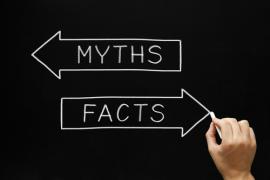
So why is it that people make up “facts” to a) either claim efficacy and safety that has never been shown, or b) ignore efficacy and safety where it has been unequivocally proven?
Let’s start with those who dream-up and spread stories about preventions and treatments that have never been shown to work or may even have hurt people. Americans spend billions of dollars on products, devices and gizmos believing they will prevent or cure diseases, make them strong or virile, or help them live longer lives.
What is sad is that, as proven or mainstream healthcare becomes more expensive or unreachable to many, people tend to believe and rely more on these seemingly less expensive – but useless – products. The supplements industry alone is a $30 billion dollar-plus a year industry in the US.
Here are a few examples where false health claims have been made. In many cases, they have been completely disproven with studies and data showing the opposite of their anecdotal claims, yet they are still being hawked.
Let’s start with everyone’s favorite: weight-loss products. This is a category that even has a name; when a product goes through the roof in sales based on celebrity endorsement, they call it “The Dr. Oz Effect.” Anyone can make up and tell a story about some exotic herb, some magic cream, some miraculous mineral, or some incredible juice … without any evidence that it does anything, or even evidence that the pills contain any of the supposed magic ingredient to begin with. This goes beyond weight-loss supplements; similar things can be said for many supplements for one health condition or another. Even some vitamins, which we all take as being essential, have been proven useless. Beta-carotene and vitamin-E are two such examples.
The FDA and the FTC have brought over 80 enforcement actions in the last 10 years against fraudulent claims, along with some fines. The problem is that they barely made a dent as they don’t really have much regulatory bite. So this free-for-all, buyer-beware market continues.
To a great extent, the movement to legalize marijuana on medical grounds is falling into the same hole. One example: inhaling marijuana into your lungs has not been shown to be effective in any scientifically meaningful way in rheumatoid arthritis or in any of other 30 plus conditions. Yet, some animal data and passionate anecdotes are driving a huge political movement to legalize smoked marijuana for medical purposes, including reimbursement, alongside well-studied and regulated products.
Let’s look at the other type of error or fallacy, which is when there are real data, where there are many solid clinical studies and where there has been huge regulatory scrutiny. Even in these cases, some people make up “facts” denying established proof. In the earlier examples, one can understand – though not accept – the money motive. In the case of deniers, the motives are more of a puzzle.
Take the cholesterol controversy, starting with a much-discussed article in The Atlantic back in 1989 where Thomas Moore and others since have called the whole subject a myth. After hundreds of studies in epidemiology and basic science; hundreds of treatment trials, including diet and exercise, and hundreds of analyses, re-analyses, expert reviews and expert conferences, one would think the subject is dead. But no, there are still people who say there is no proof whatsoever that high bad cholesterol is a bad thing or that lowering bad cholesterol does any good.
Look at anti-vaxers for another example. Famously, Jenny McCarthy and others used their celebrity status to spread completely unfounded stories about the risks of vaccinations for measles, mumps and rubella, among others. Many people actually believed her passionate – yet fact-less – blogs, tweets, talk-show appearances, etc. Amazingly, on more than one occasion, when a news outlet reported on a new (real) study confirming the risks of non-vaccination or the value of vaccination, they called on Jenny McCarthy as the “expert” to give the other side of the story – a purely fictional but emotional story. The sad part is that many people have followed her advice to avoid vaccinations of their children and now we see a higher incidence of these horrible diseases. Not only are children who were not vaccinated at risk, but they also put at risk all those around them, including schoolmates.
Of course, anecdotes should not be ignored altogether. Anecdotes, when repeated and well-reported, can give rise to hypotheses that can then be properly tested. But we cannot simply go from anecdote to treatment or non-treatment without the intermediate testing of hypotheses and development of proofs.
So what is the reason for these contradictory behaviors? Shouldn’t the same passionate skepticism that drives people to dismiss vaccines and cholesterol treatment be used to judge claims about supplements, vitamins and magical devices and bracelets? Why do some arbitrarily make up claims? And why do others arbitrarily ignore data? Why don’t facts always simply speak for themselves?
Myths and facts / shutterstock

